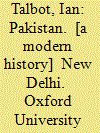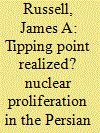| Srl | Item |
| 1 |
ID:
050208


|
|
|
|
|
| Publication |
Oxford, Oxford University Press, 1998.
|
| Description |
xvi, 432p.hbk
|
| Standard Number |
0195650735
|
|
|
|
|
|
|
|
|
|
|
|
Copies: C:1/I:0,R:0,Q:0
Circulation
| Accession# | Call# | Current Location | Status | Policy | Location |
| 042311 | 954.91/TAL 042311 | Main | On Shelf | General | |
|
|
|
|
| 2 |
ID:
084941


|
|
|
|
|
| Publication |
2008.
|
| Summary/Abstract |
The Persian Gulf and the wider Middle East are precariously perched on an uncertain nuclear threshold. Several regional states may be reconsidering their non-nuclear status. Iran's confrontation with the international community over its refusal to honour its obligations under the Nuclear Non-Proliferation Treaty is the overriding component states are viewing. Another element is Israel's nuclear program and its policy of preventing any regional state from threatening the Jewish state with nuclear weapons. Another complicating element in the strategic framework is a resurgent interest in nuclear energy.
What is the security policy community to make of these dynamics in which proliferation, deterrence, extended deterrence, and conflict escalation are all interacting in a complex interstate bargaining framework? This article applies a series of competing theoretical explanations for nuclear proliferation and assesses the implications they offer for policy prescriptions. Stressing neo-realist insights, it is shown here that control of proliferation requires recognition that the Middle East security dilemma has been altered - probably permanently - by the American invasion of Iraq, the increased political influence of Iran, and the continued violent spiral in the Arab-Israeli dispute. These three factors have combined to create new internal political pressures on regional regimes while at the same time creating a new and disturbing regional distribution of power that is shaping the region's approach to nuclear issues. Dealing with these factors is crucial in developing policies that can mitigate the further spread of nuclear weapons in the region.
|
|
|
|
|
|
|
|
|
|
|
|
|
|
|
|